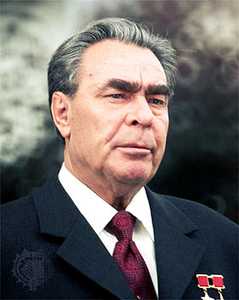Leonid Brezhnev
Leonid Ilyich Brezhnev was a politician who was General Secretary of the Central Committee of the Communist Party of the Soviet Union for 18 years. During his tenure, he was seen as an extreme communist who helped block Kosygin’s reforming politics. However, he helped encourage a temporary ‘thaw’ in Cold War politicking during the 1970s, when he met the US President Richard Nixon several times.
Born on 19 December 1906 in Kamenskoye (now the Ukrainian city of Dneprodzerzhinsk). He worked as a land surveyor and then studied metallurgy at the the Dniprodzerzhynsk Metallurgical Technicum. After graduating in 1935, he worked as an engineer. He became a Communist Party Secretary in Dnipropetrovsk in 1939. Brezhnev held the rank of colonel and served on the frontline as a political commissar during the ‘Great Patriotic War’.
Brezhnev was able to use his ties to Nikita Khrushchev to advance his career, leading to his election to the post of Supreme Soviet in 1950. Brezhnev was appointed to the Party Central Committee in 1953.
By 1957, Khrushchev had progressed to become one of the most influential figures in government. His appointment to the Politburo is not surprising as he was a keen supporter of Khrushchev.

He was promoted to President of the Presidium of the Supreme Soviet in May 1960, which meant he was effectively an honorary head of the Soviet state. Between 1960 and 1964 Brezhnev was Khrushchev's deputy and he exploited his status to gain control over the party machine.
Khrushchev lost face over the Cuban Missile Crisis, which was considered an embarrassing incident in Moscow. His political career did not come to an immediate end but he lost his respect within Soviet politics. On 14 October 1964, Brezhnev succeeded Khrushchev as First Secretary of the Soviet Communist Party. For a while he shared power with the Premier Alexei Kosygin. By the mid 1970s he had wrested power from Kosygin and appeared a formidable figure in Soviet politics.
Brezhnev helped lead the USSR during a dangerous period in the Cold War. The nuclear arms race between the USA and the USSR was still going strong. The production of nuclear missiles (including ICBMs) had grown.
During the 1960s Brezhnev was largely unsuccessful at thawing relations between East and West. During the Six Day War (1967), Arab states had possession of Soviet weapons as Moscow tried to expand its influence in the region. Israel was equipped and aided by the United States. The Soviet invasion of Czechoslovakia and the toppling of Alexander Dubček in 1968 seemed to confirm Washington and London’s worst fears.
Towards the end of the sixties there was little to indicate that Brezhnev wanted to move towards a détente period, though the SALT talks had started in 1969. Brezhnev was seen as a hard liner.
However, the cost of the Cold War was spiralling out of control in the USSR. The USA was better able to cope with the cost. The USSR struggled.
The US President Richard Nixon and Brezhnev met several times in the 1970s during the ‘detente’ period. In 1972, Nixon visited Moscow and in 1973 Brezhnev stayed at Camp David during a trip to Washington. In 1974, Nixon again visited Moscow and a year later the USSR, USA and the major European nations signed the Helsinki Declaration in 1975. Amongst other things, the nations agreed to refrain from force, to accept the inviolability of frontiers and respect basic human rights. However, the Helsinki Declaration was not an official treaty and thus the agreements were not binding.
Regardless of their different backgrounds, it is said that Nixon and Brezhnev got on well. The fact that they met at all marked a significant shift in the Cold War. However, relations took a turn for the worse again when the USSR invaded Afghanistan in December 1979.
Leonid Brezhnev died on 10 November 1982.
MLA Citation/Reference
"Leonid Brezhnev". HistoryLearning.com. 2026. Web.
Key facts
| Name: | Leonid Brezhnev |
| Birth Date: | 19 December 1906, Kamenskoye, Yekaterinoslav Governorate, Russian Empire |
| Death: | 10 November 1982 (aged 75), Zarechye, Russian SFSR, Soviet Union |
| Political party: | Communist Party of the Soviet Union |
| Family: |
Wife:
|
| Key appointments: |
General Secretary of the Central Committee of the Communist Party of the Soviet Union
|
